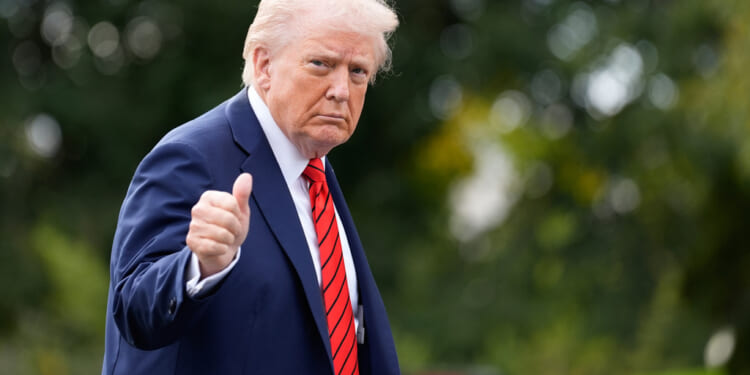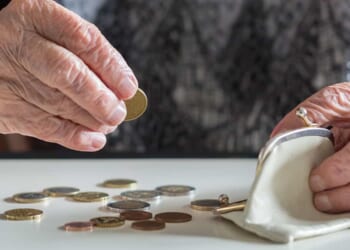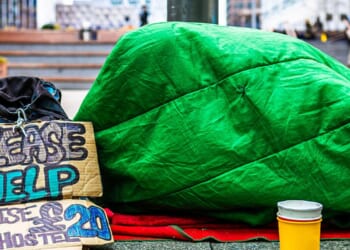President Donald Trump, just nine months into office, has all but fulfilled his campaign promise to bring the war on drugs to the cartels’ doorstep.
The president’s recent strikes on alleged drug boats in the Caribbean, coupled with his widespread efforts to secure the southern and northern borders and deport illegal immigrants, have yielded major progress on stemming the flow of narcotics into the United States, according to senior Trump administration aides and former Drug Enforcement Administration officials.
And though Trump has yet to authorize special forces operations against Mexican cartels on their home soil, something he repeatedly proposed throughout the 2024 campaign cycle, he has reviewed plans to strike at gangs, including Tren de Aragua, inside Venezuela, which the Trump administration has begun to fashion as a narcostate.
“We’ll see what happens with Venezuela,” Trump told the Washington Examiner in September about plans for strikes inside Venezuela. “Venezuela has been very dangerous with drugs and with other things, and they’ve been very, very dangerous.
“We had a lot of drugs coming in through water. We call it water drugs, just a simple term. We don’t have any boats on the water. There are no boats. There are no fishing boats. There are no anything,” he added of the four strikes the U.S. military has taken this year against alleged drug boats off Venezuela’s coast. “And now we’ll look at cartels. We’re going to look very seriously at cartels coming by land.”
However, Trump’s drug war is leaning on more than just law enforcement and military resources. The Treasury Department has also taken significant steps to dismantle international narco networks, with the Washington Examiner identifying at least 25 distinct actions carried out by the Treasury since Secretary Scott Bessent was sworn into office in February.
That list includes widespread sanctions against Mexican cartels, South and Central American drug traffickers, Chinese companies supplying fentanyl precursors to organized crime groups, and even Indian nationals operating online, counterfeit drug marketplaces.
The Treasury also targeted three Mexican banks in June — CIBanco S.A., Institución de Banca Multiple; Intercam Banco S.A., Institución de Banca Multiple; and Vector Casa de Bolsa, S.A. de C.V. — ”as being of primary money laundering concern in connection with illicit opioid trafficking.”
“Over 500,000 Americans have died of fentanyl poisoning,” Treasury Undersecretary for Terrorism and Financial Intelligence John K. Hurley said in a statement on Monday of the department’s efforts to dismantle financial institutions propping up the drug trade. “President Trump has made clear that stopping the deadly flow of drugs into our country is a top national security priority. Under Secretary Bessent’s leadership, the Treasury Department is committed to dismantling the complex financial networks that support these terrorist organizations.”
The law enforcement side of Trump’s war on drugs has been equally busy.
Department of Homeland Security officials could not provide full statistics for drug busts, seizures, or arrests the administration has carried out through the fall, but, as of the end of July, officials take credit for more than 3,600 fentanyl-related arrests, the seizure of more than 2,200 pill presses, and the confiscation of more than 27,000 pounds of illicit fentanyl. The DHS’s investigative wing additionally opened nearly 6,000 narcotics-related inquiries across that same time frame.
In late September, DHS officials claimed that fentanyl trafficking at the southern border had fallen 56%, compared to 2024. In total, they claimed to have seized more than 55,000 pounds of illicit drugs during the month of August alone.
DHS spokeswoman Tricia McLaughlin told the Washington Examiner that Trump has made U.S. borders “the most secure [they’ve] ever been in American history, and the cartels are becoming increasingly desperate.”
“President Trump and Secretary Noem have unleashed ICE law enforcement to hunt down cartel members and our US Coast Guard to target narcotraffickers with extraordinary success,” she added.
White House spokeswoman Abigail Jackson told the Washington Examiner: “President Trump’s law and order agenda has already delivered tremendous results for the American people – whether it’s closing the border in record time or targeting criminal networks, the flow of drugs in the United States has significantly decreased. This is literally saving lives. The Trump Administration will continue cracking down on illegal drugs and Making America Safe Again.”
Two former DEA officials, one of whom worked in both Trump’s first administration and under former President Joe Biden, applauded Trump’s efforts to tackle the drug trade.
“What we’re seeing really is this ‘whole of government’ approach we’ve been asking for,” the Biden administration alumnus said. “These networks are like the hydra, from Greek mythology, you know? You take out one head, and another just pops right up. The only way to effectively take on these terrorist groups, because that really is what they are, is to secure the border, stop the flow of precursor components into the West, disrupt their money networks, and, finally, take these guys off the street. President Trump is trying to do all of that, and you can already see the success start to stack up.”
The second former DEA official added, “Not to joke, but Trump is taking the war on drugs into its golden age,” referencing the president’s additions to White House decor.
Still, Trump’s drug policies have produced a number of speed bumps. Immigration and Customs Enforcement agents are facing increased resistance in cities such as Chicago and Portland, Oregon. ICE actions in Los Angeles earlier this year sparked significant protests that quickly spilled into widespread rioting across the city. And the president’s deployment of National Guard troops to police the dissent, both peaceful and violent, appears to have only added fuel to the fire.
Furthermore, concerns are growing that Trump’s war on drugs will soon spill over into a full-on war with Venezuelan President Nicolas Maduro, a dictator whom the administration has accused of working hand-in-hand with Venezuela’s narcogangs.
Earlier this month, the White House sent a notice to Congress stating that the U.S. is in “armed conflict” with narcoterrorists, and, just a few weeks ago, Trump called off U.S. special envoy Ric Grenell’s negotiations with the Maduro regime, as Secretary of State Marco Rubio openly campaigns for regime change in Venezuela.
The president also made his war on drugs a focal point of his September address before the United Nations General Assembly, warning “every terrorist thug smuggling poisonous drugs into the United States of America” that “we will blow you out of existence.”
However, not everyone views Trump’s actions regarding Venezuela as negatively destabilizing.
Venezuelan opposition leader Maria Corina Machado, the recipient of 2025’s Nobel Prize for Peace, praised Trump’s actions thus far and asked him to maintain pressure on the Maduro regime.
“We are on the threshold of victory and today, more than ever, we count on President Trump, the people of the United States, the peoples of Latin America, and the democratic nations of the world as our principal allies to achieve Freedom and democracy,” she wrote in a statement Friday morning shortly after being announced as a 2025 laureate. “I dedicate this prize to the suffering people of Venezuela and to President Trump for his decisive support of our cause!”
Despite Trump’s tough-on-drugs policies, he is considering one major reform long requested by progressives and U.S. drug policy experts: the reclassification of marijuana from Schedule I to Schedule III.
GOVERNMENT FUNDING FIGHT ENDANGERS TRUMP’S MARIJUANA RESCHEDULING PUSH
Trump confirmed in August that he is continuing the Biden-era push to reschedule marijuana, and the president has repeatedly spoken about how the reform would open new doors in medical research and a possible economic windfall for the industry.
“That determination, hopefully, will be the right one — very complicated subject, you know, the subject of marijuana,” Trump said of marijuana rescheduling during a recent press conference. “I’ve heard great things having to do with medical, and I’ve heard bad things having to do with just about everything else. But medical, and, you know, for pain and various things.”
















